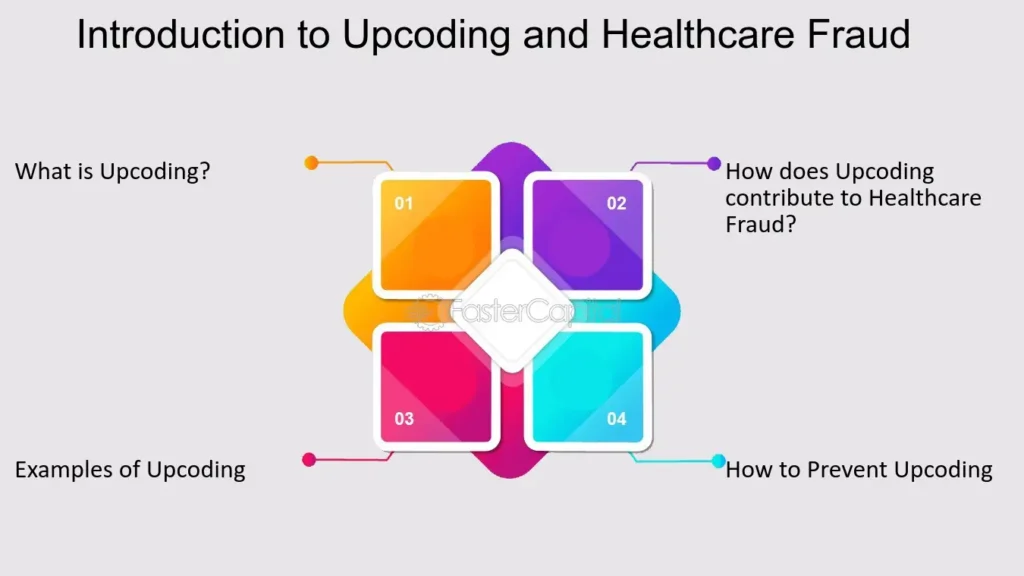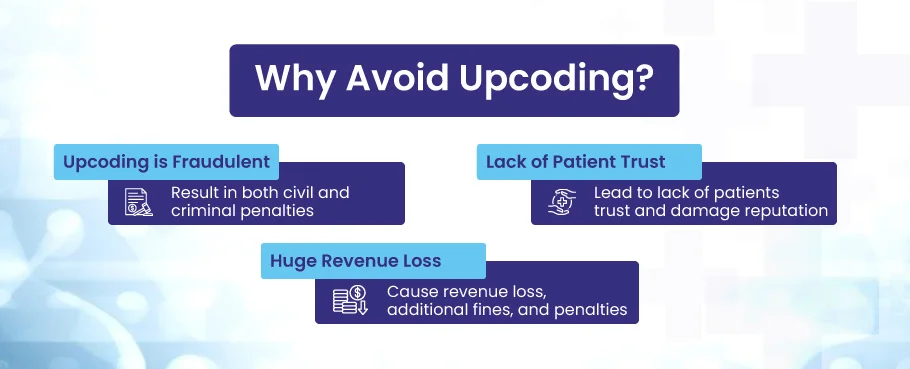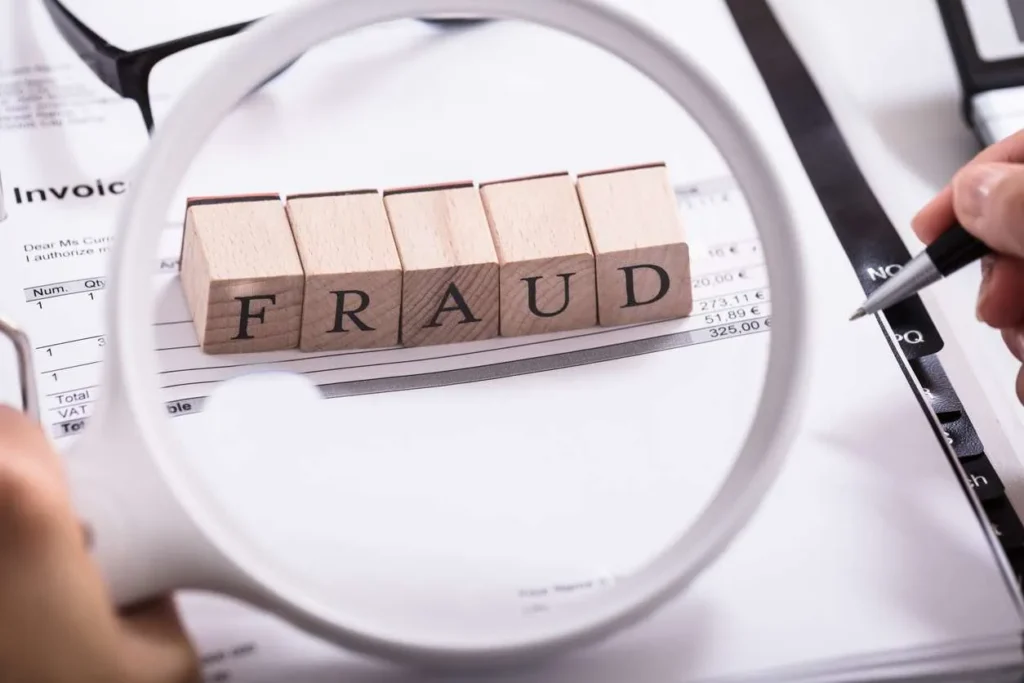The healthcare system, built on trust and service, faces a significant threat from fraudulent practices like upcoding frauds. This form of healthcare fraud not only drains billions from critical programs like Medicare and Medicaid but also erodes trust between providers, insurers, and patients. While advancements like electronic health records (EHRs) have streamlined operations, they’ve also opened avenues for abuse, making upcoding one of the most costly and pervasive fraudulent practices.
In this blogpost we will shed light into the complexities of upcoding frauds, explore its impacts on the healthcare ecosystem, and equip you with actionable insights to detect and combat this unethical practice.
What is Upcoding Fraud?

At its core, upcoding frauds involve the intentional misuse of billing codes by healthcare providers to secure higher reimbursements than what’s justified for the services rendered. Every medical procedure, test, or consultation is assigned a Current Procedural Terminology (CPT) code, and each code carries a predetermined payment rate.
Occurrence of Upcoding Frauds
- A provider submits a billing code for a complex and expensive procedure when a simpler, cheaper one was performed.
- Time-intensive consultation codes are used for brief, routine visits.
- Billing codes include secondary diagnoses or treatments that were not performed.
Example:
Imagine a patient visiting a clinic for a 15-minute consultation to address a sore throat. Instead of billing for the standard, low-cost consultation, the clinic uses a code for a 60-minute complex visit requiring extensive diagnostic efforts. This misrepresentation inflates the bill and results in unjustified revenue for the provider.
Why is Upcoding Fraud a Growing Concern?
Financial Burden on Healthcare Programs
The cost of upcoding frauds is staggering. Between 2002 and 2012, upcoding drained an estimated $11 billion from Medicare and Medicaid alone. Emergency rooms, where coding tends to be less scrutinized, are responsible for an additional $1 billion annually in fraudulent billing.
Impact on Patients
Patients often bear the brunt of these fraudulent practices. Upcoding drives up out-of-pocket expenses and can result in unwarranted insurance denials. Furthermore, the loss of trust in healthcare institutions is a long-term consequence that affects patient-provider relationships.
Increased Vulnerability with EHR Systems
While EHRs streamline medical record-keeping, they have inadvertently enabled coding manipulation:
- Copy-Paste Errors: Reusing notes from prior visits can exaggerate a patient’s condition.
- Restricted Code Menus: EHRs often limit visible codes to high-reimbursement options, steering providers toward upcoding practices.
Case Study:
A 2019 audit by the Office of Inspector General (OIG) found that from 2014 to 2019, the number of inpatient hospital stays billed at the highest severity level rose by 20%. Alarmingly, many of these stays were for patients with shorter-than-expected hospitalizations, raising red flags for upcoding frauds.
Unbundling Fraud: A Sister Practice to Upcoding
While upcoding frauds focus on inflating individual procedures, unbundling frauds involve manipulating bundled billing codes to maximize reimbursements. Medicare and Medicaid typically assign lower rates for groups of procedures commonly performed together (e.g., surgery and postoperative care).
What is Unbundling?
Unbundling, also known as “fragmentation,” occurs when a provider separates these bundled procedures and bills them individually. This increases costs for insurers and patients while providing no additional care benefits.
Example:
A hip replacement surgery includes costs for the surgeon, operating room, and postoperative care under a single code. Through unbundling, a hospital may bill for each component separately, inflating the total reimbursement.
Real-World Examples of Upcoding Fraud
Landmark Cases
HCA Healthcare – $1.7 Billion Settlement (2003)
The largest False Claims Act (FCA) case to date involved systemic upcoding at HCA Healthcare. Whistleblowers revealed the company’s deliberate practice of using higher-paying diagnostic codes to inflate Medicare reimbursements. The settlement included over $1 billion in fines for upcoding frauds.
NextCare Inc. – $10 Million Settlement (2012)
NextCare, an Arizona-based urgent care chain, was found guilty of upcoding basic procedures as complex services and conducting unnecessary medical tests. Whistleblowers received a share of the recovered funds, highlighting the critical role they play in exposing frauds.
GlaxoSmithKline – $325 Million Settlement (1998)
In a notable unbundling fraud case, GSK used bundled blood tests for marketing purposes but billed Medicare as separate procedures, leading to inflated reimbursements.
How to Detect Upcoding Fraud

Spotting Red Flags on Your Medical Bills
Patients can play a role in identifying frauds. Here’s how:
- Request a Detailed Bill: Ask for itemized charges instead of accepting summary bills.
- Check CPT Codes: Use online tools to verify that the codes align with the services received.
- Review Your Explanation of Benefits (EOB): Cross-check the insurer’s record of payments with your provider’s charges.
Reporting Fraud
Fraudulent practices can be reported through several avenues:
- Whistleblower Lawsuits: Under the FCA, whistleblowers (or “relators”) can file a qui tam lawsuit and potentially earn 15–30% of recovered funds.
- Insurance Providers: Notify your insurer if billing discrepancies arise.
- State Healthcare Regulators: File a formal complaint if overcharging persists.
Case Study:
In 2011, a former Dallas City employee uncovered fraudulent ambulance transport upcoding. By coding all emergency responses at the advanced life support level, regardless of care provided, the city overbilled Medicare and Medicaid. The whistleblower’s efforts led to a $2.47 million settlement.
The False Claims Act and Its Role in Fighting Medicare Fraud
What is the False Claims Act (FCA)?
The False Claims Act is a federal law designed to combat frauds against government programs, including Medicare, Medicaid, and Tricare. Initially enacted during the Civil War, the FCA has become one of the most powerful tools for detecting and prosecuting healthcare frauds, including upcoding frauds. The Act provides for civil penalties against individuals or entities that knowingly submit false claims to the government.
- Under the FCA, healthcare providers who submit false or inflated claims can face penalties of up to $23,607 per false claim, in addition to triple the damages incurred by the government. This means that the financial stakes for upcoding frauds are high, not only for providers but also for the taxpayers funding these programs.
- Example: In 2019, a healthcare system was fined $12.2 million for improperly coding inpatient services at higher levels, triggering an FCA lawsuit. This case highlights how providers who engage in fraudulent billing practices can face steep financial penalties.
Qui Tam Provisions: Empowering Whistleblowers
One of the most significant provisions of the FCA is the qui tam clause, which allows private individuals—often employees or insiders—to file lawsuits on behalf of the government. These lawsuits allow whistleblowers to bring attention to upcoding frauds and other fraudulent activities that would otherwise go undetected.
- The whistleblower, also known as the relator, may receive a reward ranging from 15% to 30% of the recovery amount if the government successfully pursues the case. This financial incentive has made the FCA a crucial tool for detecting healthcare frauds, including EHR coding abuse.
Case Study: Sound Inpatient Physicians (2013)
- A whistleblower exposed a large-scale upcoding scheme at Sound Inpatient Physicians, revealing that the healthcare provider intentionally upcoded patient services to inflate reimbursements. The case resulted in a $14.5 million settlement, with the whistleblower receiving a substantial share of the recovered amount. This case underscores the critical role that whistleblowers play in bringing frauds to light and holding providers accountable.
Protections for Whistleblowers
Whistleblowers who report frauds under the FCA are protected by law from retaliation. The FCA includes robust protections for individuals who expose fraudulent activities, ensuring they are not subject to adverse employment actions, such as termination, demotion, or harassment. These protections are vital in encouraging individuals to come forward with information that can lead to the identification and prosecution of upcoding frauds.
- Example: The FCA guarantees that whistleblowers can seek legal recourse if they face retaliation, such as reinstatement to their former position, back pay, and damages for emotional distress.
Medicare Fraud Examples: Unveiling the Costs of Upcoding
Fraudulent billing practices, such as upcoding frauds, have far-reaching financial and social impacts. Medicare frauds continues to be a significant issue in the U.S., costing taxpayers billions of dollars annually. Let’s explore some notable Medicare frauds examples where upcoding frauds has led to substantial financial losses.
Emergency Room Billing Abuses
Emergency rooms are a particularly vulnerable area for upcoding frauds due to the high volume of patients and the variability in the services provided. Fraudulent billing often occurs when hospitals code a routine emergency visit as a high-severity case, such as billing for “acute respiratory failure” when the patient only required basic care.
- Example: A 2021 audit of emergency departments revealed a significant spike in visits coded as “high severity” despite being for routine cases. The OIG estimated that $1 billion annually is lost to frauds in emergency room upcoding, with many hospitals overcharging Medicare for services that were not provided.
Durable Medical Equipment (DME) Providers
Durable medical equipment (DME) frauds often involve providers billing Medicare for equipment that was either never delivered or not medically necessary. Upcoding frauds can occur when a provider submits codes for higher-cost equipment than what was actually supplied to the patient.
- Example: A Texas-based DME supplier was found guilty of submitting $10 million in fraudulent Medicare claims for equipment that patients never received. Whistleblower insiders played a key role in exposing this fraudulent practice, highlighting the importance of reporting frauds from within the industry.
Healthcare Fraud Detection: The Role of Advanced Analytic
As upcoding frauds become more sophisticated, detecting these fraudulent practices requires advanced healthcare fraud detection tools. Healthcare providers and insurers increasingly rely on data analytics, artificial intelligence (AI), and predictive models to identify billing anomalies and flag suspicious activities.
Predictive Analytics in Fraud Detection
Predictive analytics involves using historical billing data and complex algorithms to spot trends and outliers that suggest fraudulent behavior. These tools can identify patterns of upcoding, where providers consistently submit higher-cost codes than what the patient’s condition justifies.
- Example: In 2022, a radiology practice was flagged for upcoding Medicare claims for advanced imaging procedures that were unnecessary. Using predictive analytics, auditors discovered that the practice had been billing Medicare for MRI scans when only basic X-rays were needed. This resulted in a $3.5 million recovery from the fraudulent charges.
EHR Coding Audits
The use of electronic health records (EHR) has introduced new challenges in detecting upcoding frauds, particularly because EHR systems are often used to manipulate billing codes. Routine audits of EHR systems are essential in identifying discrepancies, such as the use of higher reimbursement codes that do not match the services provided.
- Example: EHR software designed to “copy-paste” information from previous visits could lead to inaccurate documentation and inflated billing. Auditors performing EHR coding audits can identify these irregularities, which, if left unchecked, could lead to large-scale Medicare overcharges.
Collaboration Between Agencies
In 2020, the Office of Inspector General (OIG) worked with private insurers and whistleblowers to uncover fraudulent upcoding in multiple healthcare systems. By collaborating with whistleblowers and using advanced data analysis, the OIG was able to recover over $1.1 billion in improper Medicare claims over a three-year period, with a significant portion of the frauds tied to upcoding.
Whistleblower Rewards in Healthcare: Incentivizing Accountability
Whistleblowers play a crucial role in identifying upcoding frauds and holding healthcare providers accountable. The financial rewards and legal protections available under the FCA serve as a powerful incentive for individuals to come forward with evidence of fraudulent activities.
How Rewards are Calculated
Under the False Claims Act, whistleblowers can receive 15% to 30% of the total recovery if the government successfully pursues the case and recovers funds. The exact amount depends on the whistleblower’s contribution to the case and whether the government intervenes in the lawsuit.
- Example: The HCA Healthcare case (2003) resulted in a record $151.5 million in whistleblower rewards, with whistleblowers receiving substantial compensation for exposing large-scale upcoding frauds within the healthcare provider’s system.
Notable Whistleblower-Led Recoveries
- GlaxoSmithKline (1998)
- Reward: $52 million shared among whistleblowers.
- Fraud Type: Unbundling frauds in blood tests, leading to inflated Medicare payments.
- IPC Healthcare (2014)
- A whistleblower exposed upcoding frauds at IPC Healthcare, resulting in a major lawsuit and a potential recovery exceeding $50 million.
How Patients Can Advocate for Themselves
While whistleblowers play a crucial role in identifying and reporting fraudulent activities such as upcoding frauds, patients also have a role in ensuring that they are not overcharged for services. Being vigilant about medical bills and understanding billing practices can help patients detect any discrepancies and avoid falling victim to frauds. Here’s how patients can advocate for themselves in the healthcare system.
Steps to Spot and Address Upcoding
- Request Itemized Bills
Patients should always request itemized bills instead of accepting summary invoices. An itemized bill will provide a line-by-line breakdown of services and charges, making it easier to spot any inaccuracies or upcoding. Without an itemized bill, it’s much harder to verify whether you’re being charged for services that were not provided. - Verify CPT Codes
Once you have an itemized bill, you can cross-check the CPT codes listed to ensure they correspond to the services actually provided. There are numerous online tools and databases available to help patients decode these medical billing codes. Services like the CPT Code Search tool by the American Medical Association can help you verify whether the charges are reasonable based on the diagnosis and treatment. - Review Your Explanation of Benefits (EOB)
Your Explanation of Benefits (EOB), which you receive from your insurance provider, is an essential document for understanding how much your insurer paid for the service and how much you owe. Comparing the EOB to the itemized bill can help you detect any discrepancies, such as upcoding where more complex and expensive procedures were billed than necessary.
Dispute Charges Through Insurance
If you notice any irregularities on your bill or in your EOB, it’s crucial to contact both the healthcare provider and your insurer. Here are some steps you can take:
- Contact the Healthcare Provider
Reach out to the provider’s billing department to ask for clarification on the charges. If you suspect upcoding frauds, explain your concerns and request an itemized statement with further details about the services rendered. Often, a simple conversation can help resolve discrepancies, and providers may be willing to adjust the bill. - File a Dispute with Your Insurance Company
If you believe you were billed for services you didn’t receive or were overcharged due to upcoding, contact your insurance provider and file a formal dispute. Insurers have processes in place for investigating billing discrepancies and can work with providers to ensure the charges align with the services rendered. - File Formal Complaints with State Healthcare Regulators
If you’re unable to resolve the issue with the provider or insurance company, consider filing a formal complaint with your state’s healthcare regulator. Most states have a healthcare fraud hotline or a consumer protection agency that can investigate fraudulent billing practices.
Case Study:
In 2011, a former Dallas City employee uncovered fraudulent ambulance transport upcoding. The City of Dallas was found to have submitted Medicare claims for advanced life support services, even when patients only received basic life support. The whistleblower’s actions led to a $2.47 million settlement, and the case highlighted how important it is for patients to be vigilant about their medical bills and report suspected frauds.
The Broader Implications of Healthcare Fraud
While upcoding frauds may seem like a minor issue to some, its consequences are far-reaching. Beyond the immediate financial implications, healthcare frauds, including upcoding and unbundling, undermines the integrity of the entire healthcare system. Here are some of the broader impacts:
Ethical and Social Costs
- Straining Public Resources
Fraudulent billing practices like upcoding cost Medicare and Medicaid billions of dollars every year. These funds are meant to support millions of vulnerable Americans who rely on public healthcare programs. Fraudulent activities divert these critical resources, making it harder to provide care for those who genuinely need it. - Eroding Trust in Healthcare Providers
When patients are victims of upcoding frauds, their trust in healthcare providers erodes. Trust is a fundamental element in the patient-provider relationship, and when patients feel exploited by fraudulent billing, they may avoid seeking care altogether or become wary of the medical system in general. This loss of trust can have long-term negative effects on healthcare outcomes. - Increasing Healthcare Costs for Everyone
When healthcare providers engage in fraudulent billing practices, the costs of these practices are often passed down to the patients in the form of higher premiums, out-of-pocket costs, and taxes. Upcoding frauds ultimately drives up healthcare costs for all patients, including those who are not directly involved in the frauds.
The Need for Vigilance
To tackle upcoding frauds and other forms of healthcare frauds, vigilance is required at all levels. Healthcare providers must adopt ethical billing practices, patients must stay informed about their medical charges, and regulators must enforce stricter audits and reporting systems to detect fraudulent behavior. Whistleblowers are often the first line of defense, as they bring these illegal practices to light, but the broader healthcare community must also work together to identify and prevent frauds before it becomes widespread.
Conclusion
Upcoding frauds and its counterpart, unbundling frauds, represent serious challenges to the integrity of the U.S. healthcare system. These fraudulent practices not only drain billions from Medicare and Medicaid but also undermine the trust that is essential for quality patient care. Thanks to the efforts of whistleblowers and advanced fraud detection tools, the fight against healthcare frauds is making progress, but continued vigilance is necessary.
By understanding what upcoding fraud is, how it works, and its consequences, healthcare professionals, patients, and whistleblowers can take meaningful steps to expose frauds and protect the integrity of healthcare systems. Whistleblower protections, the False Claims Act, and financial incentives play crucial roles in incentivizing the reporting of fraudulent activities, while patients can take proactive measures to verify the accuracy of their medical bills.
If you think your billing team has committed to false upcoding practices, contact us today and let us do the right medical billing coding for you.




